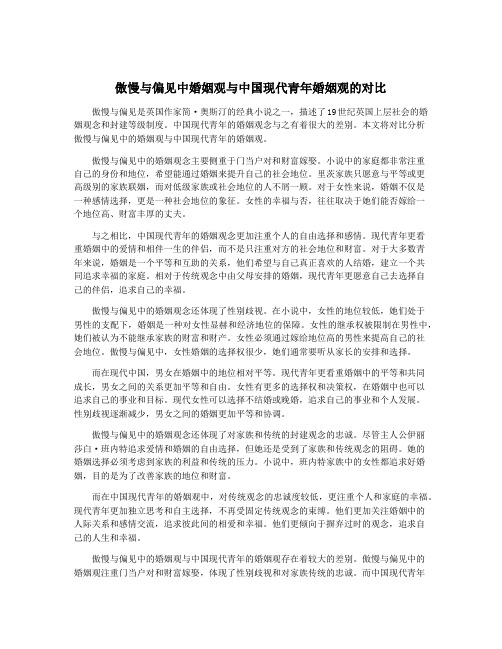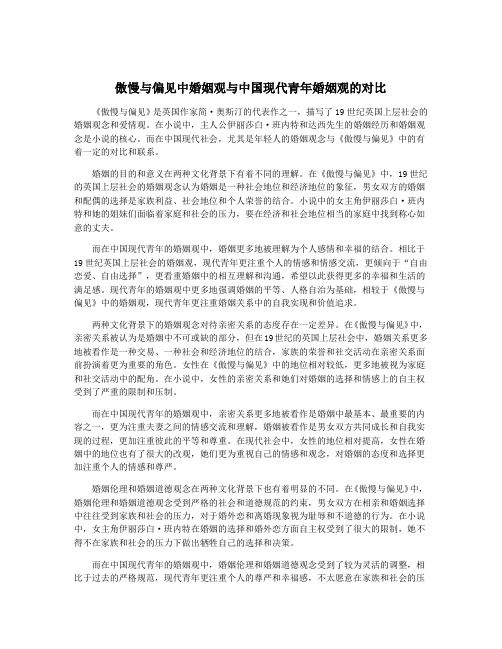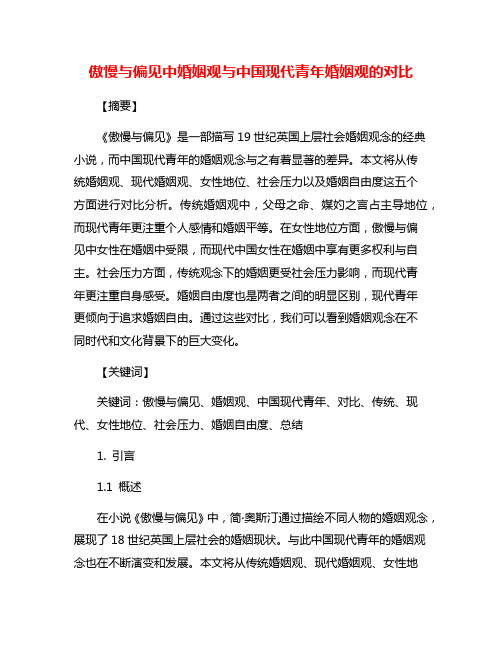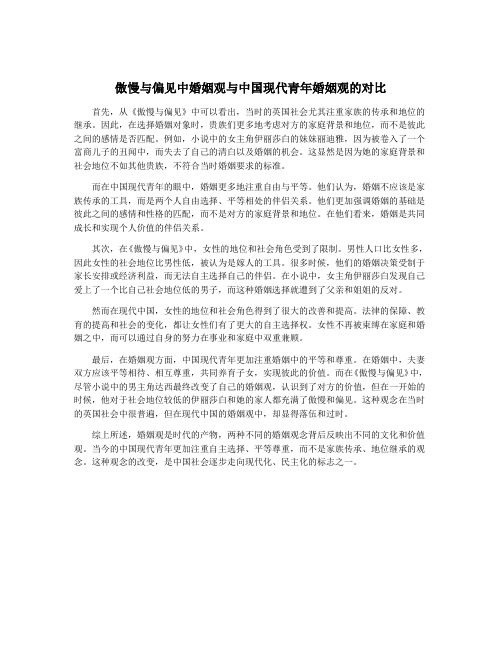傲慢与偏见中爱情观与当代爱情观对比
《傲慢与偏见》与当代婚姻观念的异同

傲慢与偏见与当代婚姻观念的异同简介《傲慢与偏见》是英国作家简·奥斯汀于1813年创作的一部经典小说。
它描绘了主人公伊丽莎白·班内特在19世纪英国社会中寻找真爱和自我价值的故事。
婚姻观念是该小说的重要主题之一,而随着社会的发展,当代婚姻观念也有了很大的变化。
本文将探讨《傲慢与偏见》与当代婚姻观念之间的异同。
1. 婚姻目的在《傲慢与偏见》中,婚姻被视为财富和地位的象征。
女性通常被迫选择一个富有、高贵而合适的丈夫来保证自身和家族的经济状况。
然而,在当代社会,婚姻目的已经发生了巨大变化。
现代人更加注重爱情、共同价值观以及情感上的匹配度,而非只考虑物质条件。
2. 自由选择在《傲慢与偏见》中,女性的自由选择权受到很大限制。
她们必须服从家族和社会的期望,在婚姻问题上失去了自主权。
相比之下,当代人更加强调个人自由和独立意志。
婚姻成为一种自愿的选择,双方都有权利决定自己的伴侣。
3. 婚姻理念《傲慢与偏见》中,爱情并不是主要考虑因素,财富和地位才是衡量一个人是否适合结婚的标准。
然而,在当代社会,爱情和互相尊重成为了最重要的婚姻基础。
现代人更加注重夫妻间的平等、共同成长以及理解和支持对方。
4. 女性地位在19世纪,《傲慢与偏见》中展示了女性在社会结构中较低的地位,她们被视为男性的附属品。
但是在当今社会,女性权益得到广泛关注和保护,并且女性角色在家庭和事业中开始发挥重要作用。
5. 差异带来的冲突《傲慢与偏见》中,主人公伊丽莎白和达西的婚姻充满了误解和冲突,他们的初印象是错误的。
这种差异导致了痛苦和困惑。
对比之下,当代社会中的婚姻更多地强调双方的沟通和理解,以减少在价值观和生活方式上的差异所带来的冲突。
结论《傲慢与偏见》与当代婚姻观念存在着许多显著差异。
从追求财富与地位到注重爱情和自由选择,从男性主导到平等尊重,当代婚姻观念已经发生了巨大变化。
尽管如此,小说中探索的一些基本问题仍然存在。
无论是在19世纪还是现代社会,婚姻都需要双方不断努力、坦诚沟通以及相互理解才能长久幸福。
傲慢与偏见中婚姻观与中国现代青年婚姻观的对比

傲慢与偏见中婚姻观与中国现代青年婚姻观的对比傲慢与偏见是英国作家简·奥斯汀的经典小说之一,描述了19世纪英国上层社会的婚姻观念和封建等级制度。
中国现代青年的婚姻观念与之有着很大的差别。
本文将对比分析傲慢与偏见中的婚姻观与中国现代青年的婚姻观。
傲慢与偏见中的婚姻观念主要侧重于门当户对和财富嫁娶。
小说中的家庭都非常注重自己的身份和地位,希望能通过婚姻来提升自己的社会地位。
里茨家族只愿意与平等或更高级别的家族联姻,而对低级家族或社会地位的人不屑一顾。
对于女性来说,婚姻不仅是一种感情选择,更是一种社会地位的象征。
女性的幸福与否,往往取决于她们能否嫁给一个地位高、财富丰厚的丈夫。
与之相比,中国现代青年的婚姻观念更加注重个人的自由选择和感情。
现代青年更看重婚姻中的爱情和相伴一生的伴侣,而不是只注重对方的社会地位和财富。
对于大多数青年来说,婚姻是一个平等和互助的关系,他们希望与自己真正喜欢的人结婚,建立一个共同追求幸福的家庭。
相对于传统观念中由父母安排的婚姻,现代青年更愿意自己去选择自己的伴侣,追求自己的幸福。
傲慢与偏见中的婚姻观念还体现了性别歧视。
在小说中,女性的地位较低,她们处于男性的支配下,婚姻是一种对女性显赫和经济地位的保障。
女性的继承权被限制在男性中,她们被认为不能继承家族的财富和财产。
女性必须通过嫁给地位高的男性来提高自己的社会地位。
傲慢与偏见中,女性婚姻的选择权很少,她们通常要听从家长的安排和选择。
而在现代中国,男女在婚姻中的地位相对平等。
现代青年更看重婚姻中的平等和共同成长,男女之间的关系更加平等和自由。
女性有更多的选择权和决策权,在婚姻中也可以追求自己的事业和目标。
现代女性可以选择不结婚或晚婚,追求自己的事业和个人发展。
性别歧视逐渐减少,男女之间的婚姻更加平等和协调。
傲慢与偏见中的婚姻观念还体现了对家族和传统的封建观念的忠诚。
尽管主人公伊丽莎白·班内特追求爱情和婚姻的自由选择,但她还是受到了家族和传统观念的阻碍。
傲慢与偏见中婚姻观与中国现代青年婚姻观的对比

傲慢与偏见中婚姻观与中国现代青年婚姻观的对比《傲慢与偏见》是英国作家简·奥斯汀的代表作之一,描写了19世纪英国上层社会的婚姻观念和爱情观。
在小说中,主人公伊丽莎白·班内特和达西先生的婚姻经历和婚姻观念是小说的核心。
而在中国现代社会,尤其是年轻人的婚姻观念与《傲慢与偏见》中的有着一定的对比和联系。
婚姻的目的和意义在两种文化背景下有着不同的理解。
在《傲慢与偏见》中,19世纪的英国上层社会的婚姻观念认为婚姻是一种社会地位和经济地位的象征,男女双方的婚姻和配偶的选择是家族利益、社会地位和个人荣誉的结合。
小说中的女主角伊丽莎白·班内特和她的姐妹们面临着家庭和社会的压力,要在经济和社会地位相当的家庭中找到称心如意的丈夫。
而在中国现代青年的婚姻观中,婚姻更多地被理解为个人感情和幸福的结合。
相比于19世纪英国上层社会的婚姻观,现代青年更注重个人的情感和情感交流,更倾向于“自由恋爱、自由选择”,更看重婚姻中的相互理解和沟通,希望以此获得更多的幸福和生活的满足感。
现代青年的婚姻观中更多地强调婚姻的平等、人格自治为基础,相较于《傲慢与偏见》中的婚姻观,现代青年更注重婚姻关系中的自我实现和价值追求。
两种文化背景下的婚姻观念对待亲密关系的态度存在一定差异。
在《傲慢与偏见》中,亲密关系被认为是婚姻中不可或缺的部分,但在19世纪的英国上层社会中,婚姻关系更多地被看作是一种交易、一种社会和经济地位的结合,家族的荣誉和社交活动在亲密关系面前扮演着更为重要的角色。
女性在《傲慢与偏见》中的地位相对较低,更多地被视为家庭和社交活动中的配角。
在小说中,女性的亲密关系和她们对婚姻的选择和情感上的自主权受到了严重的限制和压制。
而在中国现代青年的婚姻观中,亲密关系更多地被看作是婚姻中最基本、最重要的内容之一,更为注重夫妻之间的情感交流和理解,婚姻被看作是男女双方共同成长和自我实现的过程,更加注重彼此的平等和尊重。
傲慢与偏见中婚姻观与中国现代青年婚姻观的对比

傲慢与偏见中婚姻观与中国现代青年婚姻观的对比《傲慢与偏见》是英国作家简•奥斯汀的代表作之一,该小说不仅展现了19世纪英国上流社会的婚姻观,也提出了婚姻的重要性及亲密关系的复杂性。
与之对比,中国现代青年的婚姻观念以及态度发生了很大的变化。
本文将以《傲慢与偏见》中的婚姻观与中国现代青年婚姻观之对比进行讨论。
在《傲慢与偏见》中,婚姻被视为一种经济和社会地位的交易。
小说中的女性们往往不自由地被安排与富有且有地位的男士相亲相配,以换取经济保障和社会地位的提升。
这种现象与中国的传统观念有所相似,以宗族观念为主导的婚姻安排是中国古代封建社会中的常态。
随着社会的发展,中国现代青年对婚姻的看法发生了巨大变化。
现代青年更加强调自由婚姻的权利与自主选择的重要性。
他们不再只是被动地接受父母或社会的安排,而是更注重个人的情感需求和自身的价值观。
他们更倾向于与自己心仪的人结婚,追求感情的共同理解与尊重,以真爱为基础的婚姻。
小说中对于适龄女性婚姻的强调和繁琐准备的描写也与中国现代青年的婚姻观产生了对比。
在小说中,女性对自身婚姻的前景十分重视,不仅要时刻保持良好的家庭背景和形象,还要学会技能以此来吸引男性的注意。
而在中国现代社会,女性不仅注重自身的职业发展,也注重个人的能力培养以及思想的独立。
她们更加强调自己在婚姻中的地位和权利,追求平等和尊重。
在《傲慢与偏见》中,女性在婚姻中的地位相对较低,常常要以男性的需求为重,并且对家庭的责任感十分强烈。
而在中国现代青年的婚姻观中,女性要求更多的平等和尊重。
他们追求彼此间的合作与支持,渴望分享家庭责任,共同承担起经济和家庭的压力。
《傲慢与偏见》中的婚姻观念以及中国现代青年的婚姻观存在着明显的对比。
在小说中,婚姻被视为经济和社会地位的交易,女性的地位较低,对家庭责任感强烈。
而在中国现代青年的婚姻观中,更加注重自由婚姻的权利与自主选择,追求平等和尊重,注重个人发展和自身的情感需求。
这种差异反映了社会的发展和观念的变迁,也体现了中国现代青年的自主意识和追求幸福感的态度。
傲慢与偏见中婚姻观与中国现代青年婚姻观的对比

傲慢与偏见中婚姻观与中国现代青年婚姻观的对比【摘要】《傲慢与偏见》是一部描写19世纪英国上层社会婚姻观念的经典小说,而中国现代青年的婚姻观念与之有着显著的差异。
本文将从传统婚姻观、现代婚姻观、女性地位、社会压力以及婚姻自由度这五个方面进行对比分析。
传统婚姻观中,父母之命、媒妁之言占主导地位,而现代青年更注重个人感情和婚姻平等。
在女性地位方面,傲慢与偏见中女性在婚姻中受限,而现代中国女性在婚姻中享有更多权利与自主。
社会压力方面,传统观念下的婚姻更受社会压力影响,而现代青年更注重自身感受。
婚姻自由度也是两者之间的明显区别,现代青年更倾向于追求婚姻自由。
通过这些对比,我们可以看到婚姻观念在不同时代和文化背景下的巨大变化。
【关键词】关键词:傲慢与偏见、婚姻观、中国现代青年、对比、传统、现代、女性地位、社会压力、婚姻自由度、总结1. 引言1.1 概述在小说《傲慢与偏见》中,简·奥斯汀通过描绘不同人物的婚姻观念,展现了18世纪英国上层社会的婚姻现状。
与此中国现代青年的婚姻观念也在不断演变和发展。
本文将从传统婚姻观、现代婚姻观、女性地位、社会压力和婚姻自由度等方面展开对比分析,以探讨傲慢与偏见中的婚姻观与中国现代青年的婚姻观的差异和联系。
在《傲慢与偏见》中,婚姻并非只是爱情的问题,更多地是家族利益和社会地位的考量。
传统的婚姻观念认为,婚姻是一种合作关系,要考虑到彼此的出身背景、财富和社会地位。
相比之下,中国现代青年更加注重自身的感情和幸福。
他们更倾向于自由选择自己的伴侣,而不受到传统的家族压力和社会规范的束缚。
2. 正文2.1 传统婚姻观的对比传统婚姻观在《傲慢与偏见》中体现为父母为子女安排婚姻,强调门当户对、财富地位等因素。
在中国现代青年婚姻观中,婚姻的选择更加着重于个人感情和价值观的匹配。
传统婚姻观中,婚姻是家族之间的联姻,以维持家族地位、财富和影响力;而现代婚姻观则更强调夫妻之间的平等和共同理想。
傲慢与偏见中婚姻观与中国现代青年婚姻观的对比

傲慢与偏见中婚姻观与中国现代青年婚姻观的对比首先,从《傲慢与偏见》中可以看出,当时的英国社会尤其注重家族的传承和地位的继承。
因此,在选择婚姻对象时,贵族们更多地考虑对方的家庭背景和地位,而不是彼此之间的感情是否匹配。
例如,小说中的女主角伊丽莎白的妹妹丽迪雅,因为被卷入了一个富商儿子的丑闻中,而失去了自己的清白以及婚姻的机会。
这显然是因为她的家庭背景和社会地位不如其他贵族,不符合当时婚姻要求的标准。
而在中国现代青年的眼中,婚姻更多地注重自由与平等。
他们认为,婚姻不应该是家族传承的工具,而是两个人自由选择、平等相处的伴侣关系。
他们更加强调婚姻的基础是彼此之间的感情和性格的匹配,而不是对方的家庭背景和地位。
在他们看来,婚姻是共同成长和实现个人价值的伴侣关系。
其次,在《傲慢与偏见》中,女性的地位和社会角色受到了限制。
男性人口比女性多,因此女性的社会地位比男性低,被认为是嫁人的工具。
很多时候,他们的婚姻决策受制于家长安排或经济利益,而无法自主选择自己的伴侣。
在小说中,女主角伊丽莎白发现自己爱上了一个比自己社会地位低的男子,而这种婚姻选择就遭到了父亲和姐姐的反对。
然而在现代中国,女性的地位和社会角色得到了很大的改善和提高。
法律的保障、教育的提高和社会的变化,都让女性们有了更大的自主选择权。
女性不再被束缚在家庭和婚姻之中,而可以通过自身的努力在事业和家庭中双重兼顾。
最后,在婚姻观方面,中国现代青年更加注重婚姻中的平等和尊重。
在婚姻中,夫妻双方应该平等相待、相互尊重,共同养育子女,实现彼此的价值。
而在《傲慢与偏见》中,尽管小说中的男主角达西最终改变了自己的婚姻观,认识到了对方的价值,但在一开始的时候,他对于社会地位较低的伊丽莎白和她的家人都充满了傲慢和偏见。
这种观念在当时的英国社会中很普遍,但在现代中国的婚姻观中,却显得落伍和过时。
综上所述,婚姻观是时代的产物,两种不同的婚姻观念背后反映出不同的文化和价值观。
当今的中国现代青年更加注重自主选择、平等尊重,而不是家族传承、地位继承的观念。
傲慢与偏见中婚姻观与中国现代青年婚姻观的对比

傲慢与偏见中婚姻观与中国现代青年婚姻观的对比《傲慢与偏见》是英国作家简·奥斯汀的作品,于1813年首次出版。
该小说以19世纪英国上流社会的爱情婚姻为主题,通过主人公伊丽莎白·班纳特的视角,描绘了婚姻观念的种种现象和矛盾。
与当代中国青年的婚姻观相比,可以发现一些相似之处和不同之处。
傲慢与偏见中的爱情婚姻观注重门当户对。
在小说中,伊丽莎白的姐妹们都受到了家庭的期望与压力,必须找到一个地位和财富相当的丈夫。
这种观念代表了19世纪英国爱情婚姻中的普遍现象,也反映了当时社会的阶级差异和经济条件对婚姻的影响。
与之相比,在现代中国青年的婚姻观中,门当户对的重要性已经被相对削弱。
现代社会相对开放,越来越多的人认为婚姻应该建立在相互了解与尊重的基础上,而不仅仅是地位和财富的匹配。
傲慢与偏见中的婚姻观也存在一些被动性的特点。
在小说中,班纳特家的女儿们需要积极参与社交场合,以便找到合适的丈夫。
这种被动地寻找与等待的婚姻观在当时是十分普遍的现象。
相比之下,现代中国青年更加注重个人的努力与积极主动。
他们追求有真爱的婚姻,会主动寻找机会扩大自己的社交圈,参与各类活动,增加交友的机会。
与《傲慢与偏见》中的婚姻观相比,中国现代青年的婚姻观更加注重平等和尊重。
在小说中,伊丽莎白与达西之间的关系从最初的误解与偏见慢慢发展到了相互了解与尊重,并最终选择走到一起。
这一点与当代中国青年的追求相似。
现代社会追求男女之间的平等,夫妻间的关系更加注重平等与尊重,而不是上下级关系。
婚姻被视为伴侣关系,是一种承诺与责任。
傲慢与偏见中的婚姻观与现代中国青年的婚姻观在某些方面有一些相似之处,比如注重门当户对、重视个人幸福感和自由选择等。
由于时代与文化的不同,现代中国青年更加注重平等与尊重,对于婚姻的追求更加积极主动,追求真爱与个人成长。
婚姻不再仅仅是一种交易,而是建立在相互了解、尊重和爱情的基础上的伴侣关系。
傲慢与偏见中婚姻观与中国现代青年婚姻观的对比

傲慢与偏见中婚姻观与中国现代青年婚姻观的对比《傲慢与偏见》是英国作家简·奥斯汀的著名小说,它讲述了英国乡绅家庭埃尔顿先生和本内特家五个姑娘之间的婚姻故事。
而中国现代青年的婚姻观则受到了社会变革、经济发展以及文化传统等多种因素的影响。
本文将从追求、选择、自由、传统、经济等方面对比《傲慢与偏见》中的婚姻观和中国现代青年的婚姻观。
追求的方式有所不同。
在《傲慢与偏见》中,追求婚姻的方式主要依靠社交场合中的相识相知。
达西先用带有偏见的眼光看待伊丽莎白,但在相处过程中慢慢改变了态度。
而在中国现代青年的婚姻观中,追求婚姻的方式更多是通过相亲、婚恋网站等婚姻介绍所进行,强调了家庭和社会的这种干预,减少了机缘和巧合带来的作用。
婚姻的选择标准也存在差异。
在《傲慢与偏见》中,婚姻的选择往往依靠家庭财富、地位和社交背景等因素。
达西先生的姐姐与巴林夫人结婚可以说是因为彼此的家庭背景相近,而达西和伊丽莎白则是因为彼此对对方的个性和品德有所了解而结合成婚。
而中国现代青年更加注重婚姻中的相互理解和沟通,更加注重个人的感受和情感,经济条件成为选择的次要因素。
自由度的不同也是导致两者婚姻观差异的原因之一。
在《傲慢与偏见》中,大多数的婚姻都受制于家庭和社会的压力。
父母的意愿和安排往往会对孩子的婚姻产生影响,姐姐们时刻等待着能嫁给一个有钱人的机会。
而中国现代青年更加追求自由和个性的表达,在婚姻的选择上更加注重自己的利益和幸福感。
传统与观念的差异也是两者婚姻观不同的原因之一。
在《傲慢与偏见》中,婚姻往往需要经过家庭的协商和父母的同意,也需要考虑到社会地位和家庭传统等因素。
而中国现代青年对于婚姻的传统观念不再像以前那样严格,开始倡导婚姻的平等和尊重。
经济因素也对婚姻观产生了重要影响。
在《傲慢与偏见》中,婚姻往往需要考虑到男方的经济实力和女方的嫁妆。
而中国现代青年更加注重婚后生活的质量和幸福感,对于物质条件的重视不再像以前那样追求高到不能再高。
- 1、下载文档前请自行甄别文档内容的完整性,平台不提供额外的编辑、内容补充、找答案等附加服务。
- 2、"仅部分预览"的文档,不可在线预览部分如存在完整性等问题,可反馈申请退款(可完整预览的文档不适用该条件!)。
- 3、如文档侵犯您的权益,请联系客服反馈,我们会尽快为您处理(人工客服工作时间:9:00-18:30)。
【经典资料,WORD文档,可编辑修改】【经典考试资料,答案附后,看后必过,WORD文档,可修改】Section?I:Listening?Comprehension?(20?points)Directions:?This?Section?is?designed?to?test?your?ability?to?understand ?spoken?English.?You?will?hear?a?selection?of?recorded?mate rials?and?you?must?answer?the?ques?tions?that?accompany?them.?There?are?three?parts?in?this?se ction,?Part?A,?Part?B?and?Part?C.?Remember,?while?you?are?doing?the?test,?you?should?first?pu t?down?your?answers?in?your?test?booklet.?At?the?end?of?the ?listening?comprehension?section,?you?will?have?5?minutes?t o?transfer?all?your?answers?from?your?test?booklet?to?ANSWE R?SHEET?1.?(20?points)Now?look?at?Part?A?in?your?test?booklet.Part?ADirections:?For?Questions?1—5,?you?will?hear?a?talk?about?American?education.?While?you ?listen,?fill?out?the?table?with?the?information?you've?heard.?Some?of?the?information?has?been?.given?to?you?in?the?table.?Write?only?1?word?or?number?in?e ach?numbered?box.?You?will?hear?the?recording?twice.?You?no w?have?25?seconds?to?read?the?table?below.?(5?points)American?Educationschools?organized?by1general?compulsory?education?continues?to___?(years?old)2 the?age?formal?school?begins___?(years?old)3the?length?of?time?in?high?school?in?rural?areas___?(years)4the?aim?of?US?educationprovide?equal?___?for?all5Part?BDirections:?For?questions?6—10,?you?will?hear?a?talk?about?a?travel?on?the?Angeles?Moun tains.?While?you?listen,?complete?the?sentences?or?answer?t he?questions.?Use?not?more?than?3?wordsfor?each?answer.?You ?will?hear?the?recording?twice.?You?now?hae?25?seconds?to?r ead?the?sentences?and?questions?below.?(5?poits)The?group?of?people?left?Los?Angeles?on6The?people?were?looking?forward?to?a?week?of7The?peak?of?the?next?mountain?was?covered8They?could?only?travel?a?few?miles?an?hour?because?of?the9 They?spent?a?wonderful?day10Part?CDirections:?You?will?hear?three?pieces?of?recorded?material .?Before?listening?to?each?one,?you?will?have?time?to?read? the?questions?related?to?it.?While?listening,?answer?each?q uestion?by?choosing?A,?B,?C?or?D.?After?listening,?you?will ?have?time?to?check?your?answers.?You?will?hear?each?piece? once?only.?(10?points)Questions?11—13?are?based?on?the?following?monologue.?You?now?have?15?se conds?to?read?Questions?11—13.11.?The?two?aspects?of?music?mentioned?in?the?talk?are?____ __.A.?sedative-stimulative?musicB.?stimulative-rock?musicC.?stimulative-jumpy?musicD.?sedative-smooth?music12.?A?synonym?for?“stimulate”?in?this?talk?is?______A.?sedateB.?calmC.?energizeD.?raise13.?What?kind?of?music?would?the?speaker?recommend?for?a?ne rvous?person?A.?Rock?and?roll?music.B.?Irregular?harmonies.C.?Repeated?rhythms.D.?Disjunct?melodies.Questions?14—16?are?based?on?the?following?monologue.?You?now?have?15?se conds?to?read?Questions?14—16.14.?Why?don't?the?people?in?some?rural?areas?get?the?news?a nd?information?by?radio?A.?Because?it?is?too?expensive?to?listen?to?the?radio.B.?Because?some?rural?parts?of?the?world?have?no?electricit y.C.?Because?the?news?or?information?from?the?outside?world?i s?not?important.D.?Because?they?don't?enjoy?it.15.?What's?the?trouble?forthe?poor?people?A.?Batteries?are?very?expensive.B.?Batteries?aren't?availbl e.C.?Batteries?are?not?convenient.D.?They?can't?afford?the?el ectricity.16.?How?long?will?the?clockwork?radio?play?A.?For?an?hour?and?a?half.B.?For?an?hour.C.?For?two?hours.D.?For?half?an?hour.Questions?17—20?are?based?on?the?following?monologue.?You?now?have?20?se conds?to?read?Questions?17—20.17.?What?is?the?purpose?of?the?broadcast?A.?To?make?recommendations?on?sensible?dieting.B.?To?report?the?latest?advances?in?physical?therapy.C.?To?relate?an?experiment?combining?sleep?and?exercise.D.?To?offer?advice?about?sleeping?problems.18.?According?to?the?speaker,?what?happens?when?you?toss?an d?turn?to?get?comfortable?A.?Your?heart?rate?is?lowered.B.?It?becomes?harder?to?relx.C.?You?become?too?tired?to?sleep.D.?Sleep?rhythms?are?disrp ted.19.?According?to?the?speaker,?what?sometimes?causes?people?to?have?trouble?sleeping?A.?Failure?to?rest?during?the?day.B.?Lack?of?sleep?on?weeke nds.C.?Vigorous?exercise?in?the?evening.D.?Eating?cheese?before ?going?to?bed.20.?What?does?the?speaker?say?about?sleeping?pills?A.?They?might?eventually?cause?you?to?close?sleep.B.?They?help?produce?a?neurotransmitter?in?the?brain.C.?You?must?not?drink?milk?if?you?take?them.D.?They?make?it?unnecessary?to?take?naps.You?now?have?5?minutes?to?transfer?all?your?answers?from?yo ur?test?booklet?to?ANSWER?SHEET.THIS?IS?THE?END?OF?SECTION?ISection?II:?Vocabulary?and?Structure?(10?points) Directions:?There?are?20?incomplete?sentences?in?this?secto n.?For?each?sentence?there?are?four?choices?marked?A,?B,?C? andD.?Choose?the?ONE?answer?that?best?completes?the?sentenc e.?Then?.blacken?the?corresponding?letter?on?the?ANSWER?SHEET?1?with?a?pencil.21.?Most?people?chose?him?as?one?of?______?statesmen?of?tha t?year.A.?popularB.?favoredC.?favoriteD.?favorable22.?He?soon?received?promotion,?for?his?superiors?realized? that?he?was?a?man?of?considerable?______.A.?abilityB.?future?C.?possibilityD.?opportunity23.?The?complier?______?the?article?to?make?it?fit?the?spac e?available?in?a?magazine.A.?turns?down?B.?cuts?downC.?pulls?downD.?runs?down24.?The?bank?extends?long-term?______?at?favorable?rate?to? foreign?buyers,?thus?financing?the?purchase?of?US?goods?and ?services.?A.?mortgages?B.?securities?C.?loans?D.?insurances25.?He?tried?to?______?his?involvement?in?this?scheme?but?e ?finally?gave?in?and?confessed.A.?declineB.?reject?C.?refuseD.?deny26.?Through?teaching,?man?is?able?to?build?his?basic?abilit ies?into?new?and?more?______?skills.A.?complicated?B.?complex?C.?confusedD.?confined27.?Those?two?will?never?co-operate?while?there's?such?a?ba sic?______?of?interest?between?them.A.?confusionB.?contradiction?C.?contrastD.?conflict28.?All?I'm?trying?to?do?is?to?______?why?your?condition?ha s?not?been?improved.A.?look?forB.?find?outC.?search?forD.?get?in29.?My?brother?likes?eating?very?much?but?he?isn't?very?___ ___?about?the?food?he?eats.A.?specialB.?peculiarC.?particularD.?unusual30.?The?detective?had?found?a?few?______?towards?the?murder ,?but?still,?he?had?no?idea?who?the?murderer?was.A.?guidesB.?indicationsC.?cluesD.?hints31.?It?is?not?always?possible?to?foresee?the?obstacles?____ _?your?way?towards?an?ambitious?goal.A.?blockedB.?blocking?C.?to?blockD.?to?blacking32.?We?can?share?what?we?know,?______,?with?someone?who?has ?need?of?that?knowledge?or?skill.A.?however?little?it?might?beB.?though?little?it?might?beC.?however?it?might?be?littleD.?as?little?it?might?be33.?It?is?time?the?nations?of?the?world?______?a?halt?to?th e?manufactures?of?nuclear?weapons.A.?would?callB.?callC.?calledD.?will?call34.?The?teacher?said?the?essays?were?mostly?very?good,?but? ______?of?Jane's?and?Tom's?there?was?much?room?for?improvem ent.A.?in?caseB.?for?the?sake?of?C.?in?orderD.?in?the?case35.?All?the?tasks?______?ahead?of?time,?they?decided?to?go? on?holiday?for?a?week.A.?had?been?fulfilledB.?were?fulfilledC.?having?been?fulfilledD.?been?fulfilled36.?No?one?is?sure?______?damage?the?cosmic?rays?can?do?toa ?human?being,?but?scientists?feel?that?brief?exposure?is?pr obbly?not?very?harmful.A.?that?B.?whatC.?whetherD.?which37.?Someone?of?us?had?told?Smith?about?______?a?lecture?the ?following?day.A.?there?beingB.?there?be?C.?there?would?beD.?there?was38.?One?investigation?showed?that?forty?percent?of?those?ki lled?in?auto?accidents?______?if?they?had?been?wearing?seat ?belt.A.?would?have?been?savedB.?could?have?been?savedC.?should?have?been?savedD.?might?have?been?saved39.?The?pressure?of?a?gas?plays?______?important?a?part?tha n?that?of?a?liquid.A.?no?lessB.?none?lessC.?none?the?lessD.?not?the?less40.?Many?a?time?______?me?good?advice,?but?I?refused?to?fol low?it.A.?my?teacher?has?givenB.?has?my?teacher?givenC.?my?teacher?had?givenD.?had?my?teacher?givenSection?III:?Cloze?(5?points)Directions:?For?each?numbered?blank?in?the?following?passag e,?there?are?four?choices?marked?A,?B,?C,?and?D.?Choose?the ?best?one?and?mark?your?answer?on?the?ANSWER?SHEET?1.Energy?equals?mass?times?the?speed?of?light?squared.?This?i s?the?famous?equation?of?Albert?Einstein.?It?41?to?the?cate gory?of?the?theory?of?relativity,?and?it?equates?energy?wit h?mass.?All?things?are?made?up?of?atoms.?When?42?of?an?atom ?travels?at?almost?the?speed?of?light,?and?we?put?more?ener gy?into?it?to?43?the?speed,?it?begins?to?increase?in?mass.? The?energy?that?makes?it?travel?fast?cannot?make?it?travel? beyond?the?speed?of?light—nothing?44?light?can?travel?that?fast—so?the?energy?goes?into?the?thing?itself?and?increases?its? mass.?Energy?45?into?mass.Why?is?the?theory?called?the?theory?of?relativity??A?thing? that?is?relative?depends?upon?something?else?to?identify?it ?or?to?define?it.?In?relativity?theory?we?identify?or?defin e?mass,?time,?and?length?46?to?the?speed?of?light. When?something?is?at?rest,?it?looks?ordinary?in?length.?Hoe ver,?when?it?travels?at?almost?the?speed?of?light,?it?becomes47?.?Time?also?changes.?However,?the?change?in?time?is?48 ?to?te?change?in?length.?The?length?of?a?thing?becomes?shor t?but?tie?becomes?long.?If?you?want?to?49?young,?relative?to?a?friend,?take?a?trio? in?a?spaceship?that?travels?at?almost?the?speed?of?light.?A nd,?although?time?and?heartbeat?50?ordinary?to?you?in?the?s paceship,?when?you?return,?look?at?your?friend:?Relative?to ?you,?he?or?she?is?old.41.?A.?prefersB.?relatesC.?belongsD.?adheres42.?A.?partB.?formC.?portionD.?fraction43.?A.?increaseB.?reduceC.?decreaseD.?shrink44.?A.?thatB.?whichC.?butD.?thus45.?A.?changesB.?becomesC.?shiftsD.?turns46.?A.?relatedB.?relationC.?relativeD.?relationship47.?A.?low?B.?shortC.?wideD.?long48.?A.?equalB.?similarC.?oppositeD.?subject49.?A.?keepB.?stayC.?remainD.?reserve50.?A.?takeB.?showC.?appearD.?seemSection?IV:?Reading?Comprehension?(40?points)Part?ADirections:?There?are?4?passages?in?this?part.?Each?passage ?is?followed?by?some?questions?or?unfinished?statements.?Fo r?each?of?them?there?are?for?choices?marked?A,?B,?C,?and?D. ?You?should?decide?on?the?best?choice?and?blacken?the?corre sponding?letter?on?the?ANSWER?SHEET?1?with?a?pencil.Questions?51?to?54?are?based?on?the?following?passage:Rich?or?poor,?we?all?have?problems:?that?unfaithful?mate,?t hat?irritating?colleague,?that?persistent?disease,?the?inve stment?that?is?turning?into?a?huge?loss.How?do?we?remain?calm,?positive?and?even?elegant?in?the?fac e?of?all?these?difficulties?of?life??The?following?suggestions?may?help.It?comes?with?the?pay.?I?have?a?friend?who?used?to?complain ?about?her?dead-end?job?and?unreasonable?boss.?Sound?famili ar??One?day?I?told?her,?“Look?at?it?this?way.?You?are?getting?paidfor?the?annoyanc e?as?well?as?the?work.?It?comes?with?the?pay.This?has?become?my?favorite?saying?for?work-related?frustrt ions.?“Take?every?day?as?a?bonus.”?When?we?learn?to?treasureeve ry?moment?of?what?we?have,?we?begin?to?see?life?in?a?whole? ew?perspective.It's?all?in?the?mind.?Sure,?the?psychologists?tell?us?it?is ?important?we?work?at?resolving?problems.?But?they?also?say ?if?you?try?to?resolve?a?problem?that?would?not?go?away,?it ?would?only?compound?the?frustration.If?you?tell?yourself?there?isn't?a?problem,?there?won't?be? one.?It's?all?in?the?mind.Stop?thinking?about?your?own?problem—help?others?instead.?A?lady?who?is?combating?a?life-threate ning?disease?revealed?she?coped?with?her?illness?by?making? herself?useful,?by?offering?help?to?others?in?a?similar?sit uation.She?has?spoken?to?at?least?five?other?women?with?breast?can cer.?She?says?that?the?sharing?has?helped?her?to?find?fresh ?meaning?in?her?own?life.Never?give?up?on?your?dream.?Why?do?we?give?in?and?give?up?when?we?meet?difficulties??Is?it?because?we?have?no?confide ncein?our?cause?and?no?commitment?for?what?we?pursue?It?was?said?that?Albert?Einstein's?last?request?on?his?deth ?bed?was?to?be?given?his?equations?and?his?unfinished?state mnt?declining?the?presidency?of?Israel.Einstein?first?picked?up?his?equations?and?lamented?to?his? son,?“If?only?I?had?more?mathematics!”?What?a?great?persistent ?spirit!One?strong-hearted?lady?was?the?late?head?of?the?tragic?Ken nedy?family,?Rose?Kennedy.?She?said?this?on?nationwide?tele vision?one?week?after?losing?yet?another?son?to?an?assassin 's?bullet—Boddy?Kennedy:?“And?we?go?on?our?way?with?no?regrets?not?looking?backward s?to?the?past,?but?we?shall?carry?on?with?courage.”Not?the?end?of?the?world.?Do?you?know?something?else??I've? learned?that?care?as?you?might,?love?as?you?might,?some?peo ple?just?don't?care?back.And?it's?not?the?end?of?the?world.?After?all,?it's?not?the? event?that?makes?a?person,?is?it??It's?what?we?do?about?tha t?happens?to?us.51.?The?appropriate?title?for?the?passage?might?be?______.A.?How?to?Face?Problems.B.?How?to?Resolve?Problems.C.?How?to?Hold?on?to?Your?Dream.?D.?How?to?Remain?Cheerful.52.?“Take?every?day?as?a?bonus”?(Para.?5)?is?most?likelyto?me an?______.A.?we?should?see?life?from?a?new?perspectiveB.?we?should?treasure?every?day?in?our?lifeC.?we?should?regard?every?day?as?the?last?day?in?our?lifeD.?we?should?enjoy?ourselves?every?day53.?Which?of?the?following?is?NOT?mentioned?by?the?author?A.?We?should?not?be?overwhelmed?by?problems?in?our?life.B.?We?can?learn?to?see?life?from?a?fresh?light.C.?We?should?have?confidence?in?our?cause?so?that?we?won't? give?in?easily.D.?Helping?others?will?make?it?easier?for?us?to?solve?our?own?difficulties.54.?The?author?seems?not?to?believe?that?______.A.?everyone?living?in?this?world,?poor?or?rich,?has?some?pr oblemsB.?we?should?not?give?in?and?give?up?in?the?face?of?difficl tiesC.?we?must?work?hard?at?solving?some?problems?which?can'tbe ?solved?easilyD.?we?should?remain?calm?and?positive?when?confronted?with? problemsQuestions?55?to?58?are?based?on?the?following?passage:Most?of?all,?America?is?inescapable.?It?is?the?world's?900-pound?gorilla:?basically?amiable?and?well-meaning,?crushing ?through?the?underbrush,?dominating?the?landscape,?altering ?the?scenery,?impossible?either?to?shoo?away?or?ignore.?Its ?fads,?fashions,?folk-ways?and?fast?food?sweep?around?the?g lobe;?its?brandishing?of?missiles?scares?even?its?allies.?I t?is?a?standard?for?the?world's?successes?and?a?scapegoat?f or?the?world's?failures.There?has?always?been?ambivalence?about?the?United?States.? Throughout?the?country's?meteoric?history,?people?have?admi red?its?energy,?riches?and?opportunity—and?envied?and?resented?its?power?and?success.?Since?World? War?II,?however,?that?ambivalence?has?become?even?more?pron ounced,?and?today?the?world?sees?Amrica?as?a?curious?parado x:?a?country?whose?military,?diplomaticand?economic?prestig e?has?been?waning?in?a?period?when?its?culural?influence?ha s?never?been?stronger.?The?jarring?discordancein?feelings?a bout?American?politics?and?culture?takes?some?odd-run?telev ision?network,and?comic?forms:?on?Nicaragua's?statefor?instance,?American?programs?like?“Barnaby?Jones”?are?interspersed?with?“commercials”?demonstrating?how?to?throw?grenades?in?the? event?of?Yankee?invasion.The?key?distinction?is?simply?between?the?American?people —who?are?seen?as?warm,?friendly?and?ingenuous—and?the?U.S.?government.?That?was?underlined?in?a?poll?cond ucted?for?Newsweek?International?in?six?countries?around?th e?world.?In?the?countries?surveyed—France,?Japan,?Great?Britain,?West?Germany,?Brazil?and?Meximost?respondents?expressed?approval?for?the?American?people ,?but?a?plurality?said?they?disapproved?of?U.S.?government? policy.?Moreover,?the?poll?found?people?inclined?to?think?t hat?a?strong?American?military?presence?increases?the?chanc es?for?war?instead?of?safeguarding?peace.?That?finding?repr esents?a?significant?change?from?the?early?postwar?years:?a ?similar?survey?taken?by?the?U.S.?Information?Agency?in?the ?early?fifties?showed?broad?approval?for?the?role?of?Americ an?troops.?American?infuence?in?the?world?is?seen?as?actual ly?increasina?perceptionthat?may?be?due?largely?to?the?stro ng?impact?America?has?on?moies,?television?and?music?around ?the?world.Some?images?of?America?remain?constant.?The?United?States?s ?still?regarded?as?a?country?of?great?affluence?that?reward s?initiative?and?industriousness,?a?place?where?educational?ba ckground?and?social?class?are?not?barriers?to?success.?The? Italian?slang?for?striking?it?rich?or?lucky?is?“ha?trovato?l'america”—“he?found?America”;?the?Chinese?have?no?word?for?America? other?than?mei?guo—the?beautiful?country.?“My?students?see?America?as?a?land?of?social?mobility?and? self-made?men,”?says?Prof.?David?Adams,?head?of?the?Americ an?Studies?Department?at?Britain's?University?of?Keele.?“Ronald?Reagan?is?the?norm,?not?the?exception.”55.?According?to?the?passage,?America?should?not?be?neglect ed?because?______.A.?American?people?are?very?kind?and?friendlyB.?America?influences?the?world?in?many?aspectsC.?America's?military?force?is?dominating?the?worldD.?America?is?the?standard?for?the?world's?success56.?The?word?“ambivalence”?(Para.?2?)?most?probably?means______. A.?the?American?paradox?B.?anger?and?jealousyC.?mixed?feelings?of?love?and?hatred?D.?admiration?and?disp leasure57.?Which?of?the?following?is?NOT?true?of?the?poll?conducte d?for?Newsweek?International?A.?It?shows?that?most?respondents?made?a?distinction?between?the?American?people?and?the?U.S.?government.B.?It?shows?that?many?people?disapprove?of?a?strong?America n?military?presence.C.?It?shows?that?most?respondents?regard?the?American?peopl e?as?warm,?friendly?and?frank.D.?It?shows?that?Reagan?is?regarded?as?a?common?president,? not?exceptionally?outstanding.58.?According?to?the?author,?all?the?following?statements?a re?true?EXCEPT?that?______.A.?people?in?the?world?blame?America?for?the?world's?failre sB.?there?has?been?a?change?in?people's?feeling?towards?U.Sm ilitary?presence?since?World?War?IIC.?American?military,?diplomatic?and?economic?prestige?has? grown?together?with?its?cultural?influenceD.?people?admire?America?for?its?energy,?riches?and?opportu nitiesQuestions?59?to?62?are?based?on?the?following?passage: Increasingly,?over?the?past?ten?years,?people—especially?young?people—have?become?aware?of?the?need?to?change?their?eating?habits ,?because?much?of?the?food?they?eat,?particularly?chemical? foods,?is?not?good?for?the?health.?Consequently,?there?has? been?a?growing?interest?in?natural?foods:?foods?which?do?no t?contain?chemical?additives?and?which?have?not?been?affect ed?by?chemical?fertilizers,?widely?used?in?farming?today.Natural?foods,?for?example,?are?vegetables,?fruits?and?grai ns?which?have?been?grown?in?soil?that?is?rich?in?organic?ma tter.?In?simple?terms,?this?means?that?the?soil?has?been?no urishedby?unused?vegetable?matters,?which?provides?it?with? essential?itamins?and?minerals.?This?in?itself?is?a?natural ?process?compred?with?the?use?of?chemicals?and?fertilizers, ?the?main?purposeof?which?is?to?increase?the?amounbut?not?t he?qualitof?fods?grown?in?commercial?farming?areas.Natural?foods?also?include?animals?which?have?been?allowed?to?feed?and?move?freely?in?healthy?pastures.?Compare?this?w ith?what?happens?in?the?mass?production?of?poultry:?there?a re?battery?farms,?for?example,?where?thousands?of?chickens? live?crowded?together?in?one?building?and?are?fed?on?food?w hich?is?little?better?than?rubbish.?Chickens?kept?in?this?w ay?are?not?only?tasteless?as?food;?they?also?produce?eggs?w hich?lack?important?vitamins.There?are?other?aspects?of?healthy?eating?which?are?now?rec eiving?increasing?attention?from?experts?on?diet.?Take,?for ?example,?the?question?of?sugar.?This?is?actually?a?non-ess ential?food!?Although?a?natural?alternative,?such?as?honey, ?can?be?used?to?sweeten?food?if?this?is?necessary,?we?can?i n?fact?do?without?it.?It?is?not?that?sugar?is?harmful?in?it self.?But?it?does?seem?to?be?an?additive:?the?quantity?we?u se?has?grown?steadily?over?the?last?two?centuries?and?in?Br itain?today?each?person?consums?an?average?of?200?pounds?a? year!?Yet?all?it?does?is?provide?s?with?energy,?in?the?form ?of?calories.?There?are?no?vitamins?n?it,?no?minerals?and?n o?fiber.It?is?significant?that?nowadays?fiber?is?considered?to?be?n ?important?part?of?a?healthy?diet.?In?white?bread,?for?example,?the?fiber?has?been?removed.?But?it?is?present?in?unrefin ed?flour?and?of?course?in?vegetables.?It?is?interesting?to? note?that?in?countries?where?the?national?diet?contains?lar ge?quantities?of?unrefined?flour?and?vegetables,?certain?di seases?are?comparatively?rare.?Hence?the?emphasis?placed?on ?the?eating?of?whole?meal?bread?and?more?vegetables?by?mode rn?experts?on?healthy?eating.59.?Recently,?some?people?are?interested?in?natural?foods?b ecause?______.A.?natural?foods?are?fresh?and?cheapB.?they?don't?like?processed?foodsC.?they?want?to?change?their?eating?habitsD.?these?foods?contain?more?vitamins,?minerals?and?fiber?et c.60.?According?to?the?passage,?to?use?chemicals?and?fertilie rs?means?______.A.?to?increase?the?amount?of?foodsB.?to?increase?the?quality?of?foodsC.?to?increase?the?amount?and?quality?of?foodsD.?to?increase?essential?vitamins?and?minerals61.?It?can?be?inferred?from?the?passage?that?______.A.?people?will?no?longer?eat?those?foods?containing?chemica l?additivesB.?people?will?not?necessarily?do?exercises?in?the?future?i f?they?eat?natural?foodsC.?natural?foods?will?find?a?good?market?in?the?futureD.?certain?diseases?will?never?befall?people?who?eat?natura l?foods62.?What's?the?best?title?for?this?passage?A.?Eating?Habits?Are?Changing.B.?Healthy?Eating.C.?Natural?Food?and?Chemical?Additives.D.?How?to?Go?on?a?Di et.Questions?63?to?65?are?based?on?the?following?passage: Many?stray?dogs?and?cats?wander?the?streets?of?cities.?Usul ly?they?end?up?in?animal?shelters,?where?staffs?must?find?w aysto?dispose?of?them.?One?legitimate?disposal?route?has?been?theresearch?laboratory.?But?in?California,?animal?rights ?groups?recently?have?been?leaning?hard?on?animal?shelters,?effective ly?cutting?off?much?of?the?supply.About?30?years?ago,?Los?Angeles?voters?soundly?defeated?a?p roposal?to?prohibit?the?release?of?animals?for?laboratory?u se.?But?today,?with?new?proposals?being?submitted?to?city?c ouncils?and?county?boards,?the?results?could?well?be?differ ent.?And?the?new?proposals?are?much?more?sweeping.?They?wou ld?create?review?boards?for?all?animal?experimentation.?A?g roup?of?California?investigators?even?have?organized?a?comm ittee?for?animal?research?in?medicine.“Most?scientists?don't?realize?the?danger,”?says?Caltech? neurobiologist?John?M.?Allman,?who?uses?monkeys?to?study?th e?organization?of?the?brain.?“Such?movements?in?the?past—in?this?country,?at?least—have?largely?been?the?efforts?of?small,?fragmented?and?rela tively?ineffective?groups.?But?this?new?movement?is?careful ly?orchestrated,?well?organized,?and?well?financed.?t?is?ea sy?to?look?at?the?history?of?animal?experimentation?andcompile?a?catalog?of?horrors.?But?the?day?is?long?past?when?a?e searcher?can?take?any?animal?and?do?anything?he?pleases?to? itwith?a?total?disregard?for?its?welfare?and?comfort.?Peopl e?dn't?realize,”?says?Allman,?“that?we?are?already?extensively?.reviewed.?In?my?work?I?must?follow?the?ethical?codes?laid?d own?by?the?National?Institutes?of?Health?and?the?American?P hysiological?Society,?among?others.?And?we?might?have?a?sur prise?visit?at?any?time?from?the?U.S.?Department?of?Agricul ture's?inspectors.?It's?the?USDA?field?veterinarians?who?do ?the?enforcing.?Believe?me,?these?inspections?are?anything, ?but?routine,?and?these?fellows?have?a?great?deal?of?power. ?Because?their?reports?can?adversely?affect?federal?funding ,?their?recommendations?are,?in?reality,?orders.”It?is?important?that?the?animal?rights?advocates?do?not?imp ose?their?solutions?on?society.?It?would?be?tragic?indeed—when?medical?science?is?close?to?learning?so?much?more?that ?is?very?useful?to?our?health?and?welfare—if?already?regulation-burdened?and?budget-restrained?resear chers?were?further?hampered?I?wonder?about?those?purists?who?seek?to?halt?all?animal?ex perimentation?on?moral?grounds:?Do?they?also?refuse,?for?th emslves?and?others,?to?accept?any?remedor?informatiothat?ga ned?through?animal?experimentation??And?do?they?have?the?ri ghtto?make?such?decisions?on?behalf?of?all?the?patients?in? cancerwards?63.?According?to?Para.?2,?which?of?the?following?statements ?is?TRUE?A.?People?in?Los?Angeles?voted?against?sending?animals?to?l aboratory?30?years?ago.B.?People?in?Los?Angeles?voted?for?sending?animals?to?anima l?shelters?30?years?ago.C.?Now?people?in?Los?Angeles?hold?the?same?attitudes?toward ?the?laboratory?use?of?animals?as?30?years?ago.D.?The?attitude?of?people?in?Los?Angeles?toward?the?laborat ory?use?of?animals?has?changed?in?the?past?30?years.64.?If?animal?rights?advocates?realize?their?ideas?on?the?e xperimentation,?what?will?happen?A.?The?scientists?are?sure?to?gain?more?research?results.B.?It?may?help?the?scientists?to?gain?more?financial?aid.C.?The?development?of?medical?science?may?slow?down.D.?The?government?may?loosen?their?regulation?of?the?experm entation.65.?What?is?the?author's?attitude?towards?people?who?oppoe? animal?experimentation?A.?Supportive.?B.?Opponent.?C.?Indifferent.?D.?Unclear. Part?BDirections:?Read?the?following?passage?carefully?and?then?g ive?short?answers?to?the?five?questions.?Write?your?answers ?on?the?ANSWER?SHEET?2.Life?on?earth?depends?on?water,?and?there?is?no?substitute? for?it.?The?current?assumption?is?that?our?basic?needs?for? water—whether?for?drinking,?agriculture,?industry?or?the?raising? of?fish?will?always?have?to?be?met.?Given?that?premise,?the re?are?two?basic?routes?we?can?go:?more?equitable?access?to?water?or?more?drastic?engineering?solutions?(more?dams,?fo r?instance,?or?massive?shifts?of?water?form?Canada?to?the?s outhwestern?United?States?using?pipelines?from?one?river?ba sin?to?another.)Looking?at?the?engineering?solution?first,?a?lot?of?my?rese arch?concentrates?on?what?happens?to?wetlands?when?you?buil d?dms?in?river?basins,?particularly?in?Africa.?The?ecology? of?suchareas?is?almost?entirely?driven?by?the?seasonal?regi me?of?the?ivethe?pulse?of?the?water.?And?the?fact?is?that?i f?you?builda?dam,?you?generally?wreck?the?downstream?ecolog y.?In?the?past,such?problems?have?been?hidden?by?a?dearth?o f?information.?But?.in?the?next?century,?governments?will?have?no?excuse?for?th eir?blissful?ignorance.The?engineers'?ability?to?control?water?flows?has?created?n ew?kinds?of?unpredictability?too.?Dams?in?Africa?have?meant ?fewer?fish,?less?grazing?and?less?floodplain?agriculture—none?of?which?were?anticipated.?And?their?average?economic? life?is?assumed?to?be?thirty?years.?Dams?don't?exist?foreve r,?but?what?will?replace?them?is?not?clear.。
